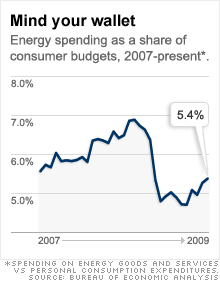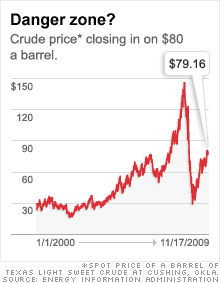Forget $100 oil. $80 oil is a problem
Energy prices don't need to rise that much before a fragile consumer-led economy could face another setback.


NEW YORK (Fortune) -- Are cash-strapped American consumers on for another date with energy price misery?
The U.S. economy remains weak and one in six Americans can't find enough work. Yet oil prices have risen steadily this year. A barrel of crude costs $79 and change, more than double its price at the end of 2008.
This year's runup pales in comparison to the one that peaked last summer above $145 a barrel. Even so, some researchers warn we could once again be approaching the point at which rising energy costs will squeeze consumers.
That could complicate recovery in an economy that, despite the tumult of the past two years, remains as consumer-driven as ever.
"If you had to ask me what is the safe driving speed, I'd say $80 a barrel," said Steven Kopits, managing director at energy market forecaster Douglas-Westwood in New York. "We have bigger problems right now, but we shouldn't forget we're still vulnerable to rising oil prices."
After last July's march to triple-digit crude, the recent increases look fairly tame.
The price of a gallon of gas is $2.63 a gallon, according to the latest AAA survey. That's well below the 2008 peak of $4.11 -- but up 25% from a year ago and 63% above last December's low.
What's more, the factors behind this spike seem apt to persist for some time. They include a pickup in global economic activity fueled by massive government spending, a decline in the purchasing power of the dollar as the U.S. holds interest rates near zero, and lack of new oil supplies coming online to meet future demand.
While those trends hardly ensure rising fuel prices, they seem to have been doing their part so far, putting gasoline within striking distance of $3 a gallon.
That's a price that could strain consumers whose spending accounts for two-thirds of economic activity.
"Any time it gets above $3, it's worth watching," said James D. Hamilton, an economics professor at the University of California at San Diego. "When you get to that level, you start to see a change in behavior as budgets get squeezed."
Hamilton said the $3-a-gallon price is noteworthy because it's around the level at which consumers are devoting 6% of their budgets to energy costs. Hitting that point in recent years seems to have prompted Americans to pull back.
Hamilton notes that Americans largely shook off the sharp runup in energy prices earlier this decade, as energy spending remained in the 5% range and homeowners were able to tap home equity lines of credit.
But that window closed when house prices stopped rising and loss-soaked banks started cutting credit.
And though it's futile to single out any one trigger for the recession that started at the end of 2007, the downturn didn't start in earnest until consumers' energy budgets breached the 6% mark in November that year.
As energy prices soared and incomes came under pressure, Americans first stopped buying pickup trucks and then deserted the local car dealer altogether. Car sales plunged in the spring of 2008 before falling off a cliff with the collapse of Lehman Brothers that September.
"The price of oil played a bigger factor in the recession than people seem to be remembering," Hamilton said.
None of this is to say a further rise in energy prices would necessarily send the economy into a tailspin. While consumers are still strapped, behavior changes should make the economy less vulnerable.
U.S. oil consumption has slid 9% since 2007, Kopits notes. Americans also drove 3% fewer miles in the latest year through August than they did two years earlier, according to data from the Transportation Department.
Hamilton points out that car sales reverted to depressed levels after the government's Cash for Clunkers promotion ended in August.
Hillard G. Huntington, executive director at the Energy Modeling Forum at Stanford University, said that while oil markets remain exposed to a possible supply disruption, he believes the memory of last year's record prices is fresh enough that another oil shock is unlikely.
"I can see a situation down the road where maybe we should worry, but I don't think we're there yet," said Huntington. "You see the most serious effects when the economy is already experiencing inflation."
But Kopits warns that every recession since 1972 has been associated with an oil price surge that took U.S. oil consumption past 4% of gross domestic product. Today, he said, the magic number to get there is $80.
"The historical record says that when prices went up, the U.S. went into recession fast," he said. ![]()
-
 The retail giant tops the Fortune 500 for the second year in a row. Who else made the list? More
The retail giant tops the Fortune 500 for the second year in a row. Who else made the list? More -
 This group of companies is all about social networking to connect with their customers. More
This group of companies is all about social networking to connect with their customers. More -
 The fight over the cholesterol medication is keeping a generic version from hitting the market. More
The fight over the cholesterol medication is keeping a generic version from hitting the market. More -
 Bin Laden may be dead, but the terrorist group he led doesn't need his money. More
Bin Laden may be dead, but the terrorist group he led doesn't need his money. More -
 U.S. real estate might be a mess, but in other parts of the world, home prices are jumping. More
U.S. real estate might be a mess, but in other parts of the world, home prices are jumping. More -
 Libya's output is a fraction of global production, but it's crucial to the nation's economy. More
Libya's output is a fraction of global production, but it's crucial to the nation's economy. More -
 Once rates start to rise, things could get ugly fast for our neighbors to the north. More
Once rates start to rise, things could get ugly fast for our neighbors to the north. More








